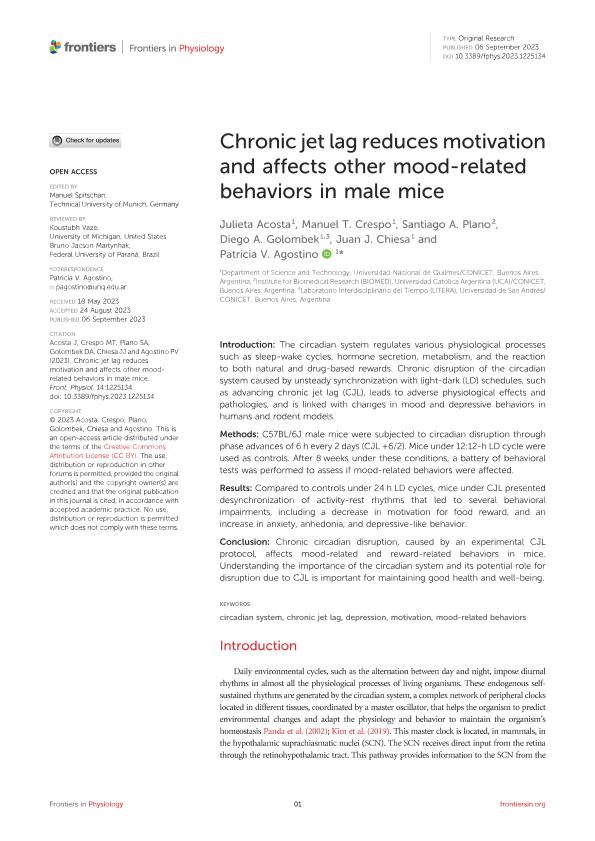Artículo
Chronic jet lag reduces motivation and affects other mood-related behaviors in male mice
Acosta, Julieta ; Crespo, Manuel Tomas; Plano, Santiago Andrés
; Crespo, Manuel Tomas; Plano, Santiago Andrés ; Golombek, Diego Andrés
; Golombek, Diego Andrés ; Chiesa, Juan José
; Chiesa, Juan José ; Agostino, Patricia
; Agostino, Patricia
 ; Crespo, Manuel Tomas; Plano, Santiago Andrés
; Crespo, Manuel Tomas; Plano, Santiago Andrés ; Golombek, Diego Andrés
; Golombek, Diego Andrés ; Chiesa, Juan José
; Chiesa, Juan José ; Agostino, Patricia
; Agostino, Patricia
Fecha de publicación:
08/2023
Editorial:
Frontiers Media
Revista:
Frontiers in Physiology
ISSN:
1664-042X
Idioma:
Inglés
Tipo de recurso:
Artículo publicado
Clasificación temática:
Resumen
Introduction: The circadian system regulates various physiological processes such as sleep-wake cycles, hormone secretion, metabolism, and the reaction to both natural and drug-based rewards. Chronic disruption of the circadian system caused by unsteady synchronization with light-dark (LD) schedules, such as advancing chronic jet lag (CJL), leads to adverse physiological effects and pathologies, and is linked with changes in mood and depressive behaviors in humans and rodent models. Methods: C57BL/6J male mice were subjected to circadian disruption through phase advances of 6 h every 2 days (CJL +6/2). Mice under 12:12-h LD cycle were used as controls. After 8 weeks under these conditions, a battery of behavioral tests was performed to assess if mood-related behaviors were affected. Results: Compared to controls under 24 h LD cycles, mice under CJL presented desynchronization of activity-rest rhythms that led to several behavioral impairments, including a decrease in motivation for food reward, and an increase in anxiety, anhedonia, and depressive-like behavior. Conclusion: Chronic circadian disruption, caused by an experimental CJL protocol, affects mood-related and reward-related behaviors in mice. Understanding the importance of the circadian system and its potential role for disruption due to CJL is important for maintaining good health and well-being.
Archivos asociados
Licencia
Identificadores
Colecciones
Articulos(BIOMED)
Articulos de INSTITUTO DE INVESTIGACIONES BIOMEDICAS
Articulos de INSTITUTO DE INVESTIGACIONES BIOMEDICAS
Citación
Acosta, Julieta; Crespo, Manuel Tomas; Plano, Santiago Andrés; Golombek, Diego Andrés; Chiesa, Juan José; et al.; Chronic jet lag reduces motivation and affects other mood-related behaviors in male mice; Frontiers Media; Frontiers in Physiology; 14; 8-2023; 1-10
Compartir
Altmétricas



